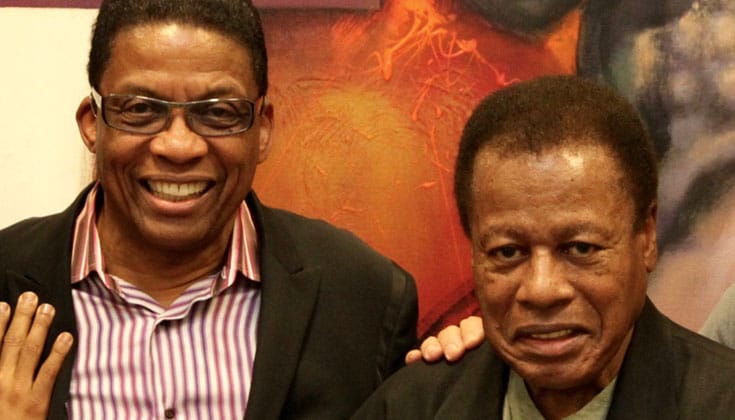Jazz pioneers Herbie Hancock and Wayne Shorter are well known for their formative roles in twentieth- and twenty-first century jazz, having played together in Miles Davis’s legendary “Second Great Quintet” (1964-69) and composing and performing as bandleaders and collaborators throughout their careers. What they’re both less known for, though, is their devotion to Buddhist principles and practice, particularly the practice of Nichiren Buddhism as taught in the organization known as Soka Gakkai International. While that connection isn’t made explicit in the new, co-penned “open letter” just issued by the two jazz giants, it seems no big leap to say that the letter — primarily aimed at the “next generation” of artists and musicians (though, “these thoughts transcend professional boundaries and apply to all people, regardless of profession,” the authors write) — is clearly informed by their shared concerns as Buddhists.
Some excerpts:
FIRST, AWAKEN TO YOUR HUMANITY
We are not alone. We do not exist alone and we cannot create alone. What this world needs is a humanistic awakening of the desire to raise one’s life condition to a place where our actions are rooted in altruism and compassion. You cannot hide behind a profession or instrument; you have to be human.
From a section called “WELCOME THE UNKNOWN“:
Every relationship, obstacle, interaction, etc. is a rehearsal for the next adventure in life. Everything is connected. Everything builds. Nothing is ever wasted. This type of thinking requires courage. Be courageous and do not lose your sense of exhilaration and reverence for this wonderful world around you.
From “UNDERSTAND THE TRUE NATURE OF OBSTACLES“:
We have this idea of failure, but it’s not real; it’s an illusion. There is no such thing as failure. What you perceive as failure is really a new opportunity, a new hand of cards, or a new canvas to create upon. In life there are unlimited opportunities. The words, “success” and “failure”, themselves, are nothing more than labels. Every moment is an opportunity. You, as a human being, have no limits; therefore infinite possibilities exist in any circumstance.
From “DON’T BE AFRAID TO INTERACT WITH THOSE WHO ARE DIFFERENT FROM YOU“:
We can never have peace if we cannot understand the pain in each other’s hearts. The more we interact, the more we will come to realize that our humanity transcends all differences.
From “BE WARY OF EGO“:
Beware of ego; creativity cannot flow when only the ego is served.
All of this, the letter ultimately states, is not just in service of art, but also contributes to “the creation of a peaceful society.” Read the whole letter, and be inspired, here.

